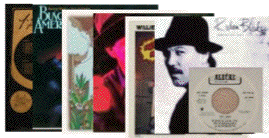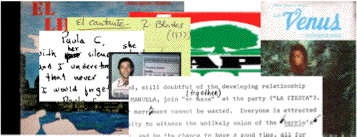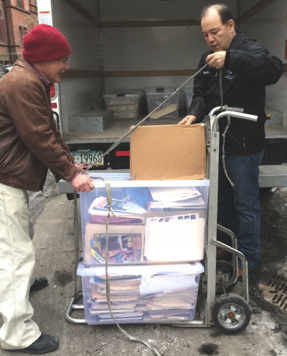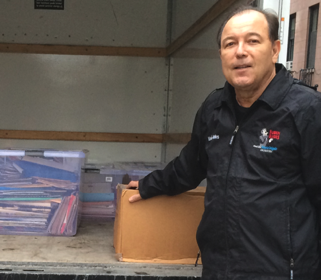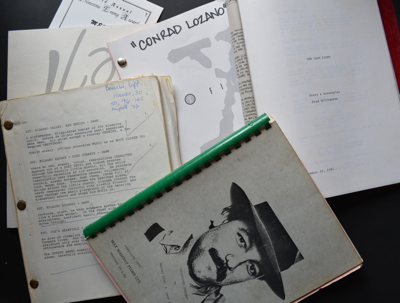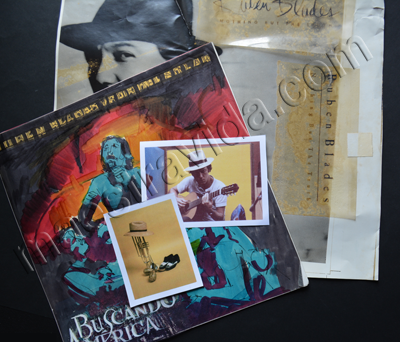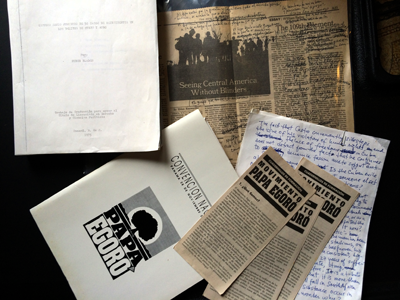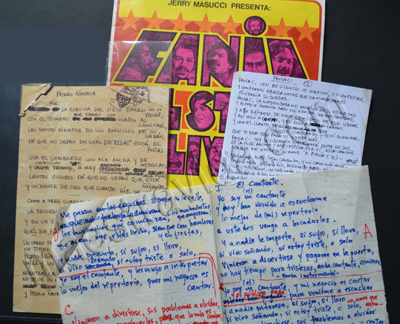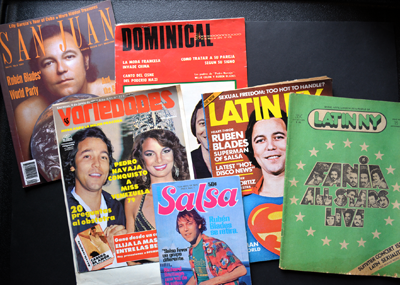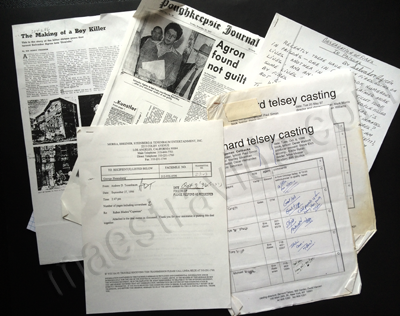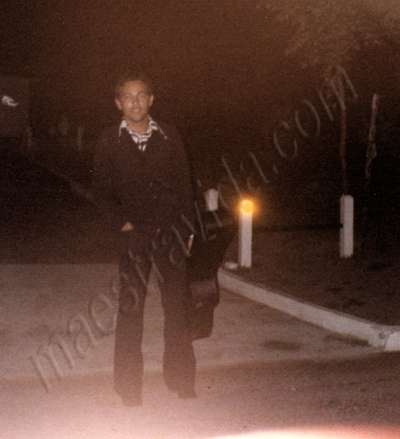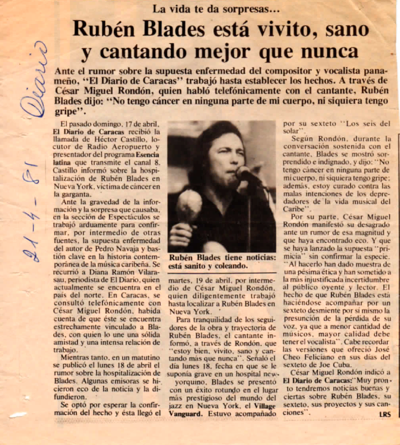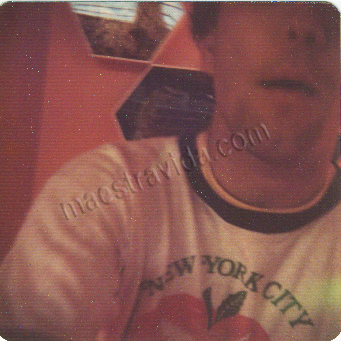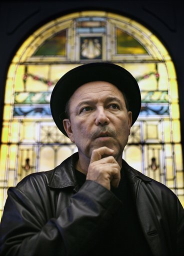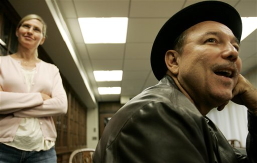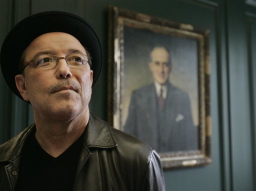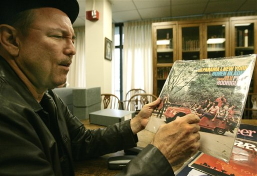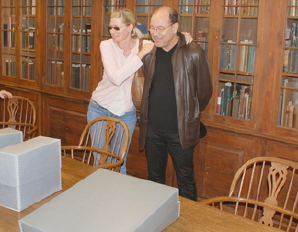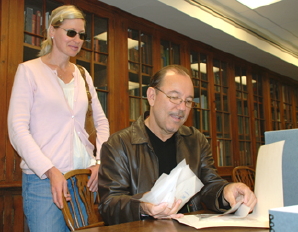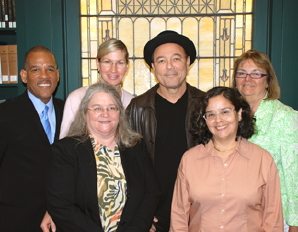 |
|
Donna Guerra, Curatorial Assistant in the Archive of World Music at Eda Kuhn Loeb Music Library, examines material from the Rubén Blades Archive. A musician, actor and political activist, Blades recently agreed to give his personal papers, recordings and other materials to Loeb Music. |
January 8, 2009 – He’s attained fame as an award-winning actor and musician, founded a political party and run for President of his native Panama and served as the Panamanian Minister of Tourism, but now Rubén Blades, LLM ’85, will add another credit to his resume – Harvard College Library benefactor.
Blades, a graduate of the Harvard University Law School, earlier this month agreed to give his personal papers, including rare recordings of rehearsals and concerts, interviews and films, books and other material to the Eda Kuhn Loeb Music Library.
“There aren’t many archives for Latin American popular musicians,” said Virginia Danielson, Richard F. French Librarian of the Loeb Music Library. “The arrival of the archive marks the opening of a whole new vein of intellectual pursuit and a new opportunity for study of Latin-American popular culture. This is a big event for us, and, we hope, for the Latin American community.”
“Rubén Blades has been a compelling presence, not just as a superstar singer-songwriter in multiple domains of Latin jazz and popular music, but also as an individual deeply engaged with the most pressing legal and political issues of our time,” said Kay Kaufman Shelemay, the G. Gordon Watts Professor of Music. “Future researchers will no doubt seek out the Rubén Blades Archive for the insights it offers into the relationship of music to the wider world.”
The arrival of the archive at Loeb Music Library, Danielson said, is largely the result of the work of two people, José Massó, host of the popular radio program ¡Con Salsa! at WBUR, and Alison Weinstock, a Blades fan, who created maestravida.com, an online discography and song reference guide dedicated to Blades’ career stretching from 1966 through 2008.
“Jose and Alison approached the Latin American, Spanish and Portuguese Division of Widener Library Collection Development with the idea of giving the material they had amassed to Harvard,” Danielson said. “Rubén liked the idea, and agreed to give his own material as well. When we looked at the contents of the collection, although it isn’t all music, a lot of it is, so we decided to bring it to the Music Library. The papers that are particular to his role as an official in Panama probably will stay in Panama, but the Harvard collection will include documents associated with Blades’ political interests alongside his musical work.”
Among the items that will eventually be collected at Loeb: a complete collection of all LPs, CDs and liner notes for Blades’ recorded music, concert and rehearsal audio and video recordings, sheet music and arrangements, lyrics and translations, magazine and newspaper interviews and clippings, photos and mementos and more.
The archive will eventually grow to include material devoted to Blades’ political career, with posters from his presidential run, along with his collection of books on afro-Cuban and salsa music, and material devoted to the business aspects of his decades-long recording career.
Though not an archivist or librarian, the first hands the material will pass through as it comes in will be Weinstock’s. As part of the gift, she was named by Blades as the coordinator of the Rubén Blades Archive at Harvard University, and will work with Danielson and other library staff to guide the collection to Harvard.
“This collection will come to us gradually, over a period of years,” Danielson said. “Right now, the material that’s come in is mostly commercial productions, but the next things we’ll get are unique video and audio recordings. That’ll be the really interesting phase. It would be fair to say we expect the archive to entail hundreds of recordings, both commercially produced and unique. I think it will be the work of three to five years to collect it all and catalog it all.”
Though some of the material has already begun to come in, Danielson emphasized that it could be months until the first items are available to library users.
“We’re at the very beginning of this project now,” Danielson said. “Things will gradually become available. We expect the first components of the collection to be available in mid- to late-2009. The archive will be cataloged in HOLLIS, and we will probably handle this material with a finding aid in OASIS. Once we have a reasonable representation, we would probably announce the existence of the cataloging, with links so people could see how to get to the archive.”
And considering Blades’ wide-ranging impact on both popular culture and social issues, Danielson said she expects the archive to become the focus of a great deal of scholarship.
“He’s a major figure,” she said. “He became known as an actor and a musician, and then decided to try to have a wider social impact, and that’s what brought him to Harvard, and from there to be a political leader in Panama.”
The collection is also a sign of the College Library’s growing interest in popular culture, particularly popular culture in the Spanish-speaking America. Considering Blades’ popularity in the U.S. as well as Panama and Central America, the archive also raises questions for scholars related to issues like transnationalism and diaspora, Danielson said.

